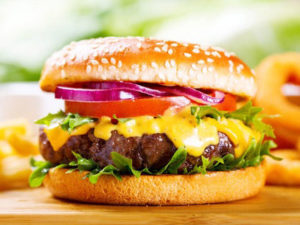

In this article, you will discover 8 foods that are literally destroying your health, leading to fatty liver symptoms and conditions like diabetes, metabolic syndrome, depression, and more, including…
- Extra weight on your belly, thighs, and hips
- High cholesterol
- Tiredness and sluggishness
- Mental fog and trouble focusing attention
- Vision that is blurry or sensitive to light
- Back or right side that are constantly sore
- Diarrhea or irregular bowel movements
- Red and itchy eyes
- Syndrome X or heart disease
- Dark or brown urine
- Insulin resistance or diabetes
- Trouble consuming alcohol
- Yellowish skin
Of course, there’s more to reversing fatty liver than just avoiding these 8 foods, you also need to know what to eat to heal your body (which we’ll cover at the end of this article).
However, eliminating these is a good start towards improving your overall health and getting your liver back into shape.
You Must Stop The Poisoning
Before You Can Start The Healing
If you were diagnosed with fatty liver, you want to take care of it as soon as possible. Procrastinate and it may become too late to easily reverse the damage, and you could face something even more serious, like cirrhosis, liver failure, even cancer.
Not to mention there are a number of big benefits beyond a healthy liver when you remove these toxic items from your life:
- Your brain becomes sharper
- You sleep easier and more deeply
- Your senses improve (taste, smell, touch, sight, and hearing)
- You find yourself feeling less stress, anxiety, and depression
- You breathe easier
- Your inflammation and joint pain lessens
- Your skin and hair begin looking strong and healthy
- You lose weight
In general, the better your liver functions, the healthier and happier you are. But be warned, it also works in the other direction, and if your liver is sick, you may find yourself circling down the drain.
If that’s happening to you, it’s time to turn your life around, and start healing your liver and body with the most powerful tool you have at your disposal: Your diet.
8 Foods To Avoid If You Want A Happy Liver
A lot of these foods are NOT going to be a big surprise, but many people appreciate the reminder, especially since there’s so much temptation and confusion around what to eat. The goal is to help you make a shift to a healthier diet and start paying attention to what you put into your body.

See, most eating is automatic – we see something familiar, like a cheeseburger – and that subconsciously activates all the great burger memories that live in our brain.
The next thing we know, we’ve slathered it in sugary relish and ketchup and stuffed it into our mouth.
Not to pick on burgers or anything, but if you were really paying attention to your food, would you have made it so sweet?
Would you have had the fries?
Would you have eaten it in 3 bites?
Heck, would you have even ordered it to begin with?
Use this article to help you…
- Break out of your old food patterns
- Become aware of what you eat and drink
- Start reading food labels diligently
You’ve already taken the very first move towards recovery by educating yourself, so give yourself a pat on the back and let’s take a look at the eight things you must avoid if you want a healthy liver…
1. Avoid Alcohol
Of all the things you ingest, alcohol should be avoided entirely. If your liver is compromised, or fatty, or if you have hepatitis, cirrhosis, fibrosis, or scarring of any kind (including NASH), alcohol is literally poison.
Even if your condition is of the non-alcoholic variety, drinking can still be dangerous because it reduces the functionality of the part of your liver that’s still healthy (ie. the part keeping you alive).
I’m not saying you can never drink again, but most of the doctors and liver experts will recommend you take a break from alcohol while you are in recovery (6 – 12 months), especially if you want to reverse the existing damage. After a month, you probably won’t even miss it.
Not only will your liver thank you, but it’s a lot easier to lose weight and stay healthy when you are are abstaining from alcohol.
2. Avoid Refined Sugar
In spite of what you may have heard, sugar is even more dangerous than saturated fat when it comes to liver health. The worst sugars are refined versions and that old devil, high fructose corn syrup (HFCS). Added sugars are found in a whopping 80% of all processed food.
Of course, you already know candy, soda, desserts and baked goods are high in sugar and should be avoided. But it has even made its way into salty food like soup, crackers, salad dressings, and chips, which is why they are so addictive.
Commercial fruit juices, energy drinks, supposedly “healthy” cereals, and condiments (I’m talking to you ketchup) can contain dangerous levels of high fructose corn syrup, which damages your liver and deteriorates your overall health.
The end result is inflammation, insulin resistance, diabetes, heart-disease, and many other serious conditions, all of which wreak havoc on your liver and make it fatty.
3. Avoid Processed Grains
Whole grains like oatmeal, quinoa, and brown rice are great, but refined and processed grain products (including white pasta, white bread, white rice and cornmeal) are not. Any food made with white flour should also be avoided, which means cookies, crackers, snack foods, cakes, and sweetened breakfast cereals.
White flour is sometimes listed as “wheat flour” to make it sound like whole wheat, but unless it includes the word whole, it’s probably highly refined. That means it acts exactly like sugar does in your body, spiking your insulin, and creating a diabetic response.
In fact, there are many doctors and nutritionists who recommend avoiding processed grains even more than sugar because the result is the same as far as your liver is concerned.
In his famous book Wheat Belly (available on Amazon), Dr. William Davis said “As a cardiologist who treats thousands of patients at risk for heart disease, diabetes, and the myriad destructive facts of obesity, I have personally observed protuberant flop-over-the-belt belly fat vanish when my patients eliminated wheat from their diets.”
Pretty powerful quote, and even if you don’t have a wheat allergy, it may be worth it to take a break from all wheat and foods with gluten for a while, at least to see how you feel without them.
4. Avoid Soft drinks
A number of studies show that people who drink soft drinks have an increased risk of developing Non-Alcoholic Fatty Liver Disease (NAFLD). Soda is literally loaded with HFCS and sugar, which we covered above.
But, you might be surprised to discover that diet soft drinks are just as bad for your liver. The sweetener aspartame is a chemical that needs to be processed by your liver, along with all the other chemicals and preservatives in soda.
Not only are they hard to digest, but aspartame can literally trick your body into producing insulin to remove sugar that’s not there, leading to highs and lows that throw your whole metabolism out of whack and interfere with your digestion, and your liver’s ability to do its job.
5. Limit Saturated Fats
If you have a fatty liver, the fats contained in animal products are very likely making things worse. Most meats and dairy products are hard on your liver. Especially avoid margarine, lard, shortening, butter, mayonnaise, and cream-based salad dressings.
Eliminate processed meats like salami, bologna, as well as fatty beef, lamb, fried foods, cheese, and cream. If it gets hard as it cools, especially when refrigerated, it’s something to stay away from until your liver gets healthy again.
Saturated fats make your liver work extra hard during the digestive process, which can give you a belly ache, and because they don’t fully digest, the fat may even creep into your bloodstream, making you feel sick, bloated, and inflamed.
6. Avoid Ice Cream
The liver is not fond of dairy because it’s hard to digest, and as we discussed, it hates sugar (because it spikes your insulin). That’s why ice cream should be avoided. But there’s another reason too, one that your doctor probably won’t tell you, and it has to do with the temperature.
Cold foods reduce the upper intestine’s natural warmth, which is 98.6 degrees, down into the 60s. This affects digestion, forcing the liver to perform double duty since food isn’t completely broken down when it gets there. The normal filtration process is strained, which is hard on your liver, kidneys, and colon.
While cold water, fresh veggie juice, and tea are OK, ice cream is a quadruple killer because of the fat, sugar, dairy, and temperature.
7. Limit Salt Intake
Most Westerners, and those in other countries who have adopted the Standard American Diet put alarmingly high levels of salt and sodium into their bodies.
This leads to greater than normal rates of heart disease, brain disorders, and most of all, dehydration, which can make your fatty liver feel even worse than it is. The liver needs liquid, specifically water, to help it flush itself out, which is why fatty liver sufferers should drink 8 – 10 cups of water per day.
8. Foods That May Contain Aflatoxins
(Like Corn Or Peanut Butter)
Aflatoxins are a family of toxins produced by certain molds found on agricultural crops such as corn, peanuts, cottonseed, and tree nuts. They are actually a type of poison that mutates the DNA in your liver and digestive tract, destroying tissue on a cellular level,
In fact, the National Cancer Institute even says that “Exposure to aflatoxins is associated with an increased risk of liver cancer.”
Bottom line is if you have a liver problem, you should avoid corn, peanut butter, and cottonseed oil, as well as anything else where aflatoxins might be present. At the very least, you should eliminate these individually to see how your body reacts.
What to do now?
In a perfect world, you would stop eating every one of those dangerous foods, and wouldn’t even consider touching them again. But we do not live in a perfect world, do we. 😉
We live in a world driven by convenience, social pressure, budgets, last-minute decisions, and lots of marketing by big food conglomerates. A world where our choices are not always under our own control because we are getting fed by others, or eating as a family, and sometimes we need to compromise our ideal diet, in order to accommodate the group.
So consider these as guidelines to follow, unless of course, you are under a doctor’s orders (in which case, do as you are instructed). The most important thing is to simply become aware of what you are putting into your body:
- How much sugar?
- How much salt?
- How many processed foods?
- How many poisons?
Then, you will have the power to minimize their consumption. Read food labels, cook for yourself, and most of all, stop eating when you are full, instead of trying to “clean your plate.” Constant overeating is a far more serious concern than having an occasional hot-dog.
And if you are wondering what you can eat, click here.



I have a swollen belly that hurts all the time. It goes down a little at night but it returns in the morning. I have always weighed around 120 and now I am 156. It’s crazy. I need all the help I can get.
You have Acetis and probably need a paracenteses. Ask your Gastro or MD. You’ll feel much better I have liver Cirrohsis 4th stage and been through several. Gotta follow the liver diet or you are doomed. Sorry
I’m sorry to hear you’re suffering. I was just diagnosed with fatty liver after having issues with my stomach. Many weight problems start with undiagnosed thyroid issues, and that can cause many other issues as well. Regardless of your age, I would suggest getting a full thyroid blood panel done. Unfortunately, most people don’t know what their TSH level is before they have problems, which makes it difficult to determine where YOUR normal level is, and not the average person’s normal which is how thyroid levels are compared to. The average TSH is 0.4 to 4.0 mIU/L. When my levels were at 3.4 this was thought to be normal. However, for me, 1.2 was normal when I was 120 lbs. and my medication dosage was too low and needed to be increased. I hope you find the source of the problem and feel beter.